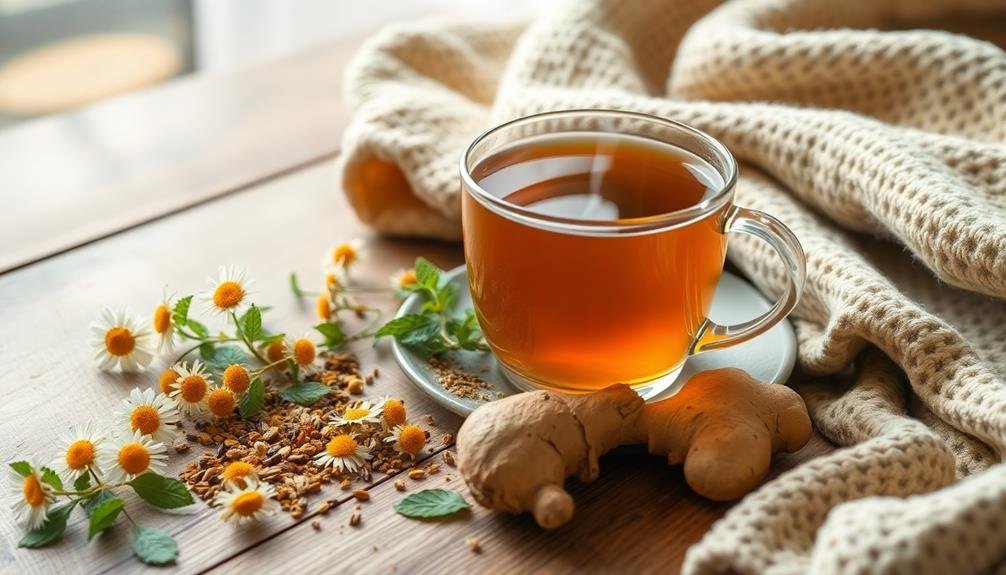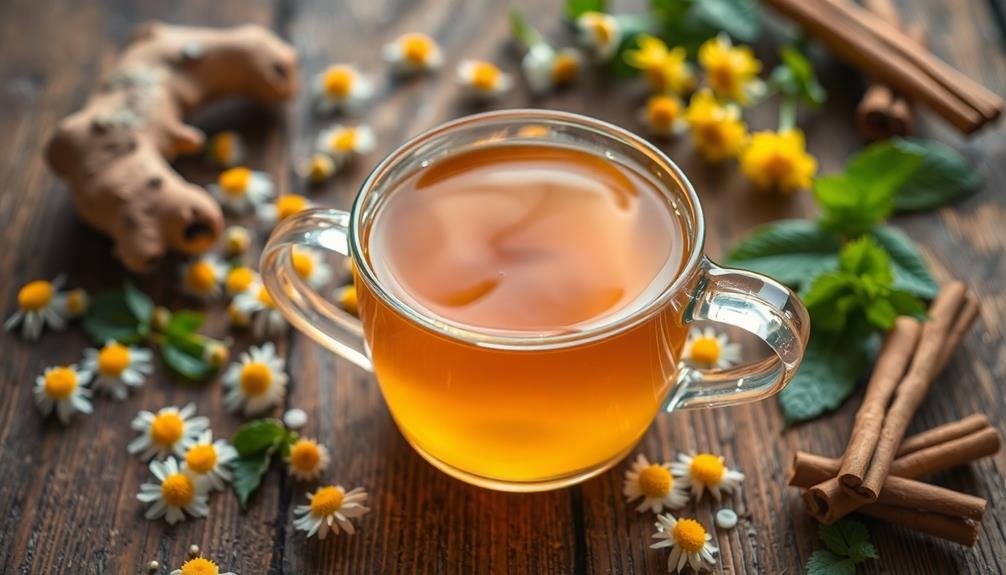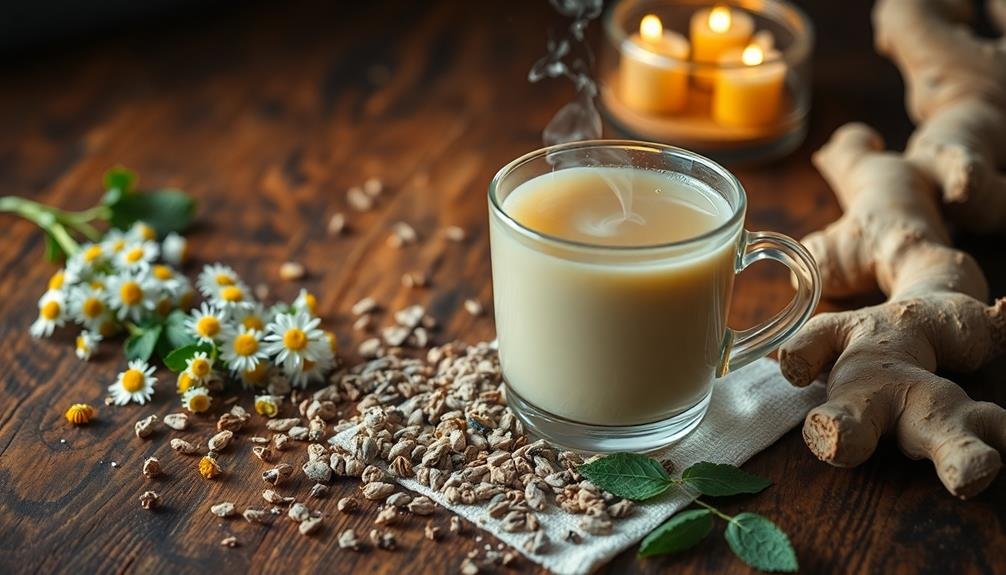Herbal teas offer natural relief from monthly discomfort by harnessing the power of plant-based compounds. They're rich in anti-inflammatory properties that reduce pain and swelling, while also providing muscle-relaxing effects to ease cramps. Teas like chamomile, ginger, and peppermint contain active ingredients that target specific symptoms, from soothing uterine contractions to alleviating bloating and nausea. These natural remedies work in harmony with your body, offering a gentle yet effective alternative to over-the-counter medications. By incorporating herbal teas into your routine, you're not just treating symptoms but supporting overall menstrual health. Discover how these soothing brews can transform your monthly experience.
Understanding Menstrual Discomfort

For many women, menstrual discomfort is a monthly reality that can disrupt daily life. You might experience a range of symptoms, including cramps, bloating, fatigue, and mood swings. These occur due to hormonal fluctuations and the uterus contracting to shed its lining.
Cramps, often the most bothersome symptom, result from prostaglandins causing uterine contractions. The severity can vary from mild to debilitating.
Bloating happens when your body retains water, leading to a feeling of fullness and discomfort. Fatigue is common as your body works harder during menstruation, depleting energy levels.
Mood swings are caused by hormonal changes affecting neurotransmitters in your brain. You might feel irritable, anxious, or depressed.
Other symptoms can include headaches, breast tenderness, and digestive issues.
Understanding these symptoms helps you address them effectively. While over-the-counter pain relievers can offer relief, many women seek natural alternatives.
Herbal teas provide a gentle, holistic approach to managing menstrual discomfort. They can help alleviate pain, reduce inflammation, and balance hormones, offering a soothing remedy for your monthly challenges.
Benefits of Herbal Teas
Herbal teas offer a wealth of benefits for managing menstrual discomfort. These natural remedies can help alleviate cramps, reduce bloating, and improve your overall mood during your period. When you sip on these soothing brews, you're not just enjoying a warm beverage; you're also providing your body with powerful plant-based compounds that can ease your symptoms.
Many herbal teas contain anti-inflammatory properties that can help reduce pain and swelling associated with menstruation. They're also often rich in antioxidants, which can boost your immune system and promote overall health. Some teas even have mild sedative effects, helping you relax and get better sleep during this time of the month.
Here's a quick guide to some popular herbal teas and their benefits:
| Tea Type | Main Benefits | Best Time to Drink |
|---|---|---|
| Chamomile | Relaxation, cramp relief | Evening |
| Ginger | Nausea reduction, anti-inflammatory | Throughout the day |
| Peppermint | Bloating relief, mood improvement | After meals |
| Red Raspberry Leaf | Uterine toning, iron boost | Daily, before period |
Top Herbs for Cramp Relief

You'll find several powerful herbs that can help alleviate menstrual cramps.
Ginger, with its potent anti-inflammatory properties, works wonders to reduce pain and discomfort.
Chamomile's muscle-relaxing effects and peppermint's soothing qualities make them excellent choices for easing cramps as well.
Ginger: Anti-Inflammatory Powerhouse
Harnessing the power of ginger can provide significant relief from menstrual cramps. This root's potent anti-inflammatory properties work to reduce prostaglandins, hormone-like substances responsible for causing uterine contractions. By decreasing these compounds, ginger effectively minimizes pain and discomfort associated with menstruation.
You'll find that ginger tea is an excellent way to incorporate this natural remedy into your routine. Simply steep fresh ginger slices or ginger tea bags in hot water for 5-10 minutes. For enhanced effects, try adding a squeeze of lemon and a teaspoon of honey. Aim to drink 2-3 cups of ginger tea daily, starting a few days before your period and continuing throughout.
Beyond its cramp-relieving abilities, ginger offers additional benefits during menstruation. It can help alleviate nausea, reduce bloating, and improve digestion. Some studies even suggest that regular ginger consumption may lead to lighter menstrual flow over time.
As with any natural remedy, it's important to consult your healthcare provider before making significant changes to your diet or supplement regimen, especially if you're taking medications or have underlying health conditions.
Chamomile: Calming Muscle Relaxant
A soothing cup of chamomile tea can be your ally in combating menstrual cramps. This gentle herb has been used for centuries to alleviate various ailments, including menstrual discomfort. Chamomile's muscle-relaxing properties help ease the tension in your uterine muscles, reducing the severity and duration of cramps.
When you drink chamomile tea, you're benefiting from its natural compounds, particularly chamazulene and bisabolol. These substances have anti-inflammatory and antispasmodic effects, which can help relax your uterus and reduce pain.
Additionally, chamomile's calming properties may help alleviate stress and anxiety often associated with menstrual periods.
To maximize chamomile's benefits, steep a tea bag or loose flowers in hot water for 5-10 minutes. Drink 2-3 cups daily during your menstrual cycle, especially in the days leading up to and during your period.
You can also enhance its effects by combining chamomile with other cramp-relieving herbs like ginger or peppermint. Remember, while chamomile is generally safe, it's best to consult your healthcare provider if you have any allergies or are taking medications that might interact with herbal remedies.
Peppermint: Soothing Pain Reliever
Countless women turn to peppermint tea as a natural remedy for menstrual cramps. This invigorating herb contains menthol, a compound known for its analgesic and antispasmodic properties. When you drink peppermint tea, it helps relax your uterine muscles, reducing the intensity and frequency of cramps.
Peppermint's pain-relieving effects aren't limited to your abdomen. It can also alleviate headaches and bloating, common symptoms during menstruation. The tea's cooling sensation provides a comforting experience, helping you feel more at ease during your cycle.
To maximize peppermint's benefits, steep a tea bag or fresh leaves in hot water for 5-7 minutes. You can enjoy it hot or cold, depending on your preference. For an extra boost, add a slice of lemon or a teaspoon of honey. Drinking 2-3 cups daily during your period can greatly reduce discomfort.
While peppermint tea is generally safe, it's best to consult your healthcare provider if you have any underlying conditions or take medications. Some women may experience heartburn or acid reflux when consuming peppermint, so listen to your body and adjust accordingly.
Chamomile: Nature's Muscle Relaxant
With its gentle floral aroma and soothing properties, chamomile tea has long been revered as nature's muscle relaxant. This calming herb can be particularly beneficial during your monthly cycle, helping to ease cramps and tension. Chamomile contains compounds that reduce inflammation and relax smooth muscle tissue, including the uterus.
When you're experiencing menstrual discomfort, a warm cup of chamomile tea can provide quick relief. It's not just the warmth that helps; the tea's active ingredients work to reduce prostaglandins, hormones responsible for causing cramps. Additionally, chamomile's mild sedative effects can help alleviate anxiety and promote better sleep, which is often disrupted during your period.
To maximize chamomile's benefits, steep the tea for 5-10 minutes and drink it slowly. You can enhance its effects by adding a touch of honey or lemon.
For best results, start drinking chamomile tea a few days before your period begins and continue throughout. Remember, while chamomile is generally safe, it's always wise to consult your healthcare provider, especially if you're pregnant or have allergies to plants in the daisy family.
Ginger: Anti-Inflammatory Powerhouse

Ginger tea can be your secret weapon against menstrual discomfort.
You'll find it reduces cramps and pain while effectively soothing any nausea you might experience.
As an added bonus, ginger improves blood circulation, potentially easing other symptoms associated with your monthly cycle.
Reduces Cramps and Pain
For centuries, women have turned to ginger as a natural remedy for menstrual discomfort. This powerful root's ability to reduce cramps and pain stems from its anti-inflammatory properties. When you consume ginger tea during your menstrual cycle, you're tapping into its natural pain-relieving effects.
Ginger works by inhibiting the production of prostaglandins, hormone-like substances that cause inflammation and pain. By reducing these compounds, you'll experience less severe cramping and overall discomfort. The warmth of the tea itself can also help relax your uterine muscles, further easing tension and pain.
You'll find that ginger tea not only addresses physical symptoms but can also help with mood swings and irritability often associated with menstruation. Its calming properties can help you feel more balanced and relaxed during this time.
To maximize ginger's benefits, steep fresh ginger root in hot water for 5-10 minutes. You can add honey or lemon for taste. Drinking 2-3 cups daily during your cycle can considerably reduce pain and cramps, offering you a natural, effective alternative to over-the-counter pain medications.
Soothes Nausea Effectively
Among ginger's many benefits, its ability to soothe nausea stands out as particularly powerful for women experiencing monthly discomfort. Ginger tea's anti-inflammatory properties can help calm your digestive system, reducing feelings of queasiness and bloating that often accompany menstruation.
When you sip on this warming brew, you're harnessing centuries of traditional medicine in a single cup.
The active compounds in ginger, including gingerols and shogaols, work to:
- Relax your stomach muscles
- Increase digestive juices
- Neutralize stomach acids
These actions combine to create a soothing effect on your entire digestive tract. You'll find that ginger tea not only eases nausea but also helps with other gastrointestinal issues that may flare up during your cycle.
For best results, brew fresh ginger root in hot water for 5-10 minutes. If you're using tea bags, steep for 3-5 minutes.
You can enhance the flavor and benefits by adding a squeeze of lemon or a teaspoon of honey. Drink this tea up to three times daily during your menstrual period to keep nausea at bay and support your overall comfort.
Improves Blood Circulation
A circulatory boost is another significant benefit of ginger tea for women experiencing monthly discomfort. Ginger's powerful anti-inflammatory properties help improve blood flow throughout your body, which can alleviate cramps and reduce bloating. When you drink ginger tea, it stimulates your circulation, promoting better oxygen delivery to your tissues and organs.
This increased blood flow can help ease menstrual pain by relaxing your uterine muscles and reducing inflammation in your pelvic area. You'll likely notice a decrease in the intensity and duration of cramps as your circulation improves. Additionally, better blood flow can help regulate your body temperature, potentially reducing hot flashes and night sweats associated with hormonal fluctuations.
Ginger tea's circulatory benefits extend beyond just menstrual relief. It can also help combat fatigue and boost your energy levels, which are often compromised during your monthly cycle.
Peppermint: Soothing Digestive Aid
Relief can be found in a simple cup of peppermint tea when menstrual cramps wreak havoc on your digestive system. This aromatic herb contains menthol, a natural compound that relaxes your intestinal muscles and eases bloating. As you sip the warm, minty brew, you'll feel its soothing effects spreading through your abdomen, calming the discomfort that often accompanies your monthly cycle.
Peppermint tea doesn't just mask symptoms; it actively works to improve your digestive health. It reduces inflammation in your gut, alleviates nausea, and can even help prevent indigestion.
When you're dealing with period-related digestive issues, reach for a cup of peppermint tea to:
- Relieve abdominal cramps and spasms
- Reduce bloating and gas
- Soothe an upset stomach
You'll find that peppermint tea is easy to incorporate into your daily routine. Brew a cup in the morning to start your day on a calm note, or enjoy it after meals to aid digestion.
For maximum benefits, steep the tea for 5-7 minutes, allowing the herb's healing properties to fully infuse into the water. You can also add a touch of honey for sweetness without compromising the tea's therapeutic effects.
Creating Effective Herbal Tea Blends

While single-herb teas offer specific benefits, creating your own herbal tea blends can maximize relief and target multiple symptoms simultaneously.
To craft an effective blend, start by identifying your primary concerns during menstruation, such as cramps, bloating, or mood swings. Choose a base herb that addresses your main issue, then add complementary herbs to enhance the effects.
For example, if you're dealing with cramps, use ginger as your base and add chamomile for relaxation and peppermint for digestive support. Aim for a ratio of 2 parts base herb to 1 part each of the supporting herbs. Experiment with different combinations to find what works best for you.
When blending, consider the flavor profiles of each herb to guarantee a pleasant taste. You can add a touch of honey or lemon to improve palatability.
Steep your blend for 5-10 minutes in hot water, covering the cup to retain essential oils. Remember to use organic, high-quality herbs for the best results.
Brewing Techniques for Maximum Benefits
To maximize the benefits of your herbal teas for menstrual relief, proper brewing techniques are essential. Start by using fresh, high-quality herbs and filtered water. For most herbal teas, steep in hot water (just below boiling) for 5-10 minutes. This allows enough time for the beneficial compounds to be extracted without making the tea bitter.
Use an infuser or tea ball to contain loose herbs, or opt for pre-packaged tea bags for convenience. Cover your cup while steeping to prevent the volatile oils from escaping. After steeping, remove the herbs and enjoy your tea while it's still warm.
For a more potent brew, try these methods:
- Cold infusion: Steep herbs in cold water overnight in the refrigerator
- Sun tea: Let herbs steep in a glass jar in direct sunlight for several hours
- Decoction: Simmer tougher herbs like roots or bark for 15-20 minutes
Remember to drink your herbal tea regularly throughout your cycle for the best results. Aim for 2-3 cups daily, starting a few days before your expected period and continuing through the first few days of menstruation.
Incorporating Teas Into Self-Care Routines

Drinking herbal teas for menstrual relief is just one part of a thorough self-care routine. You can enhance the benefits by incorporating these soothing brews into your daily rituals. Start your day with a cup of ginger tea to ease cramps and reduce bloating. During your lunch break, sip on chamomile tea to calm your nerves and reduce stress. In the evening, unwind with a cup of raspberry leaf tea to support hormonal balance.
Create a relaxing atmosphere while enjoying your tea. Light scented candles, play soft music, or practice deep breathing exercises. You can also combine tea-drinking with other self-care activities, such as reading, journaling, or taking a warm bath.
Here's a sample weekly tea routine to incorporate into your self-care regimen:
| Time of Day | Tea Type | Self-Care Activity |
|---|---|---|
| Morning | Ginger | Gentle stretching |
| Midday | Chamomile | Meditation |
| Afternoon | Peppermint | Power nap |
| Evening | Raspberry Leaf | Warm bath |
| Before Bed | Lavender | Journaling |
Frequently Asked Questions
Can Herbal Teas Replace Pain Medication for Menstrual Cramps?
While herbal teas can offer natural relief for menstrual cramps, they shouldn't completely replace pain medication. You can try them as a complementary approach, but consult your doctor if you're experiencing severe pain or discomfort.
Are There Any Side Effects of Drinking Herbal Teas for Menstrual Discomfort?
While herbal teas are generally safe, you might experience mild side effects like upset stomach or allergic reactions. It's best to consult your doctor before using them, especially if you're on medication or have underlying health conditions.
How Long Does It Take for Herbal Teas to Provide Relief?
You'll typically feel relief within 30 minutes to an hour after drinking herbal tea. However, it's best to start sipping a few days before your period for ideal effects. Everyone's different, so you may need to experiment.
Can Men Benefit From Drinking These Herbal Teas as Well?
Yes, you can benefit from herbal teas even if you're a man. They're not just for menstrual discomfort. Many of these teas offer general health benefits like reducing inflammation, aiding digestion, and promoting relaxation for everyone.
Are Herbal Teas Safe to Consume During Pregnancy or While Breastfeeding?
When you're pregnant or breastfeeding, you'll need to be cautious with herbal teas. Some can be safe, but others may pose risks. It's essential that you consult your healthcare provider before consuming any herbal teas during these periods.
In Summary
You've now discovered the power of herbal teas for easing menstrual discomfort. By incorporating chamomile, ginger, and peppermint into your routine, you're embracing nature's remedies. Remember to experiment with blends and brewing techniques to find what works best for you. As you sip these soothing teas, you're not just alleviating symptoms; you're nurturing your body and mind. Make herbal teas a part of your monthly self-care ritual and experience the gentle relief they offer.





Leave a Reply